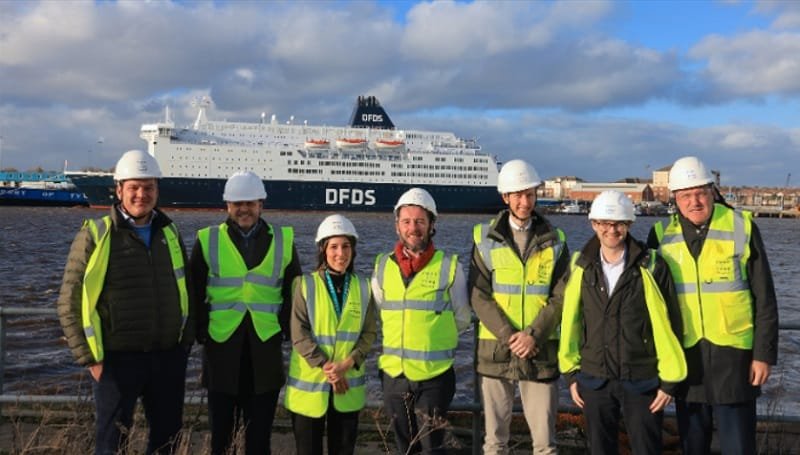(Port of Tyne) – A new government-funded initiative designed to promote environmentally friendly shipping practices within Europe has officially been launched at the Port of Tyne. This initiative, known as the Green North Sea Shipping Corridor Project, aims to establish one of the world’s first green shipping corridors connecting the Port of Tyne in the UK to the Port of IJmuiden in Amsterdam, the Netherlands.
Launched during the week of 25 November, the project is a key part of a £9 million investment announced in October by Maritime Minister Mike Kane. This funding is intended to drive forward decarbonisation efforts in the maritime industry and support the creation of green jobs across the UK. The Port of Tyne secured a grant from the International Green Corridors Fund (CMDC5: IGCF) to support the development of this green shipping corridor.
The event saw representatives from several prominent organisations come together, including the two ports, DFDS, Ricardo, and KVSA, all of which are vital to the realisation of the project. These partners are committed to developing smarter, cleaner shipping practices that contribute to a more sustainable future for global trade.
One of the primary goals of the Green North Sea Shipping Corridor Project is to decarbonise the shipping route between the UK and the Netherlands, which has been served for many years by aging vessels. By transitioning to methanol-fueled RoRo (Roll-on/Roll-off) and RoPax (Roll-on/Roll-off Passenger) vessels, the project will significantly reduce CO2 emissions along this crucial maritime route. This move aligns with DFDS’s commitment to achieving carbon neutrality by 2050, with a focus on transforming the Amsterdam-Newcastle ferry route into a green corridor.
Project Focus and Benefits
The project’s primary objective is to establish the necessary infrastructure at both the Port of Tyne and the Port of IJmuiden to support the fuelling and electrification of green-powered vessels. The feasibility study will also analyse the fuel supply chain and assess the economic and environmental benefits of the initiative.
As part of the project, the partners will work together to ensure that the landside infrastructure at both ports supports the refuelling and electrification needs of the new fleet. This infrastructure development is expected to play a critical role in reducing the environmental impact of the shipping industry, with the potential to save up to 850,000 tonnes of CO2 annually.
Matt Beeton, CEO of the Port of Tyne, highlighted the significance of the project: “This initiative represents a huge step forward for the Port in our sustainability journey. The route connecting the North East of England to Europe is vital for both tourism and trade, and by establishing this green corridor, we aim to significantly reduce carbon emissions while also fostering the creation of green jobs and driving infrastructure development at our ports.”
Declan Walsh, Director of Business Development and Strategy at DFDS, also emphasized the importance of the project: “DFDS is committed to becoming a carbon-neutral transport and logistics company by 2050. The transition of our Amsterdam-Newcastle route to a RoPAX Green Corridor is a massive undertaking, and we are fortunate to have such great partners to help us make this happen.”
Tim Scarbrough, Director of Maritime Innovation at Ricardo, noted the critical role of green corridors in decarbonising the maritime sector: “Green corridors represent a crucial milestone on the path to maritime decarbonisation. By focusing on predictable routes with consistent operational profiles, these corridors reduce adoption barriers and create momentum for sustainable change.”
Peter van de Meerakker, Managing Director of the Port of IJmuiden, expressed the importance of accelerating emission reductions: “With the zero-emission new tonnage from DFDS, we are taking an important step forward. This project helps us achieve our emissions reduction goals on both sides of the North Sea.”
Supporting UK Maritime Decarbonisation Goals
The Green North Sea Shipping Corridor Project is supported by the UK SHORE programme, which was established following the UK Government’s announcement of its largest-ever investment in the commercial maritime sector in March 2022. UK SHORE has been instrumental in advancing decarbonisation within the maritime industry, providing funding and support for innovative green technologies.
The Clean Maritime Demonstration Competition (CMDC), part of the UK SHORE programme, has played a key role in facilitating the development of green shipping corridors, including the CMDC5: IGCF, which allocated £1.5 million for feasibility studies of green corridors like this one. The UK SHORE programme is expected to continue supporting the transition of the maritime industry to net-zero emissions through various initiatives and funding opportunities.
This project not only contributes to the decarbonisation of international shipping but also positions the UK and the Netherlands at the forefront of global efforts to combat climate change within the maritime industry.
About the Partners
Port of Tyne
The Port of Tyne is a leading UK port that has been at the forefront of sustainability efforts in the maritime sector. With its commitment to reducing carbon emissions and advancing green shipping technologies, the Port of Tyne is helping drive the UK’s maritime decarbonisation agenda.
DFDS: DFDS is a major international shipping company that provides ferry services and logistics solutions. The company is committed to becoming carbon-neutral by 2050 and is actively investing in sustainable technologies to transform its fleet.
Ricardo: Ricardo is a global leader in sustainable transport solutions, providing expertise in decarbonisation, fuel efficiency, and environmental impact assessment. The company plays a crucial role in supporting green maritime projects.
Port of IJmuiden: The Port of IJmuiden is a key Dutch port and a critical gateway for shipping in the North Sea. The port is focused on accelerating its sustainability efforts to meet the challenges of reducing emissions in the maritime sector.
This project is an important step towards making the maritime industry greener and more sustainable, benefiting both the environment and the economy.
Source Port of Tyne

